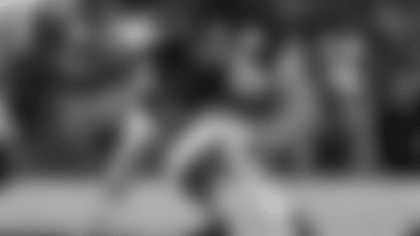Transcipt of head coach Eric Mangini's news conference with New York Jets reporters Monday afternoon:
In talking to the team this morning, I shared a story, actually a conversation I had with Marty Schottenheimer last week when he came down for the Miami game. I caught him after meetings. It was the day before his birthday, it was his wife's birthday,and I was asking him how he won 200 games and why he was so consistent and so productive year in and year out. He started explaining that when he was a player, he didn't get in very much and he didn't play as much as he'd like to, but he got in one game against [Joe] Namath, who was a friend of his, and the first opportunity he had, he got to blitz and he came in and had a clear shot at Namath and felt like he should win that situation because of Namath's knees and his mobility. And then he whiffed. Namath got the first down. And Marty stayed in for the rest of that drive, and the next drive they ran right at him and he got pushed back, then the next drive he got beat in coverage.
He said, "Eric, what I realized at the end of that drive, when I single-handedly gave up the touchdown, was that I hadn't let go of the first play. I hadn't let go of the fact that I missed him on the first play. I applied that lesson to all of my teams. I told them the play you're playing is the most important play and that you can't get caught up in what happened before because every single game is going to come down to a handful of plays." The margin, the difference between a winning team and a losing team, is very small and you don't know which one of those plays is going to be in that handful of plays. He wanted all his teams at all times to approach each play the same way.
That's what I showed the team this morning, a handful of plays that if we had played them a little bit better and executed a little bit better, the outcome could have been different. It wasn't a function of assigning blame to the players that were involved in those plays or saying that these were the only plays that were important. It was a function of showing that at any point, slight execution can dramatically affect the outcome of a game. I explained to them that I've been involved with teams that were 1-3 and were very successful. Some of these guys have been involved with a team that was 1-3, won the division and went to the playoffs. Where you are now doesn't matter. What matters is the next week. Like we always talk about, the next week, the next game is what we can control. That's what we need to focus on and that's what's important.
If we do that, the answers are in the room. There's no magic pill, there's no magic defense, there's no magic offense, there's no magic play on special teams that's going to change things. What's going to change things is us collectively playing better. That's what we're focused on, getting the corrections from today and moving on to the Giants.
On whether the team needs to play with more urgency …
The players throughout the course of the week worked hard. I thought throughout the course of the game they played hard. We got into some tough situations. We had nine penalties, which is very uncharacteristic for this team. There were things like burning two timeouts in the third quarter that are very uncharacteristic of this team. I don't think that was a function of a lack of urgency. That was a function of not executing as well as we should have. It's collective. It's getting the call in quicker and executing the call quicker. It's all of us doing a better job. I really didn't see it as a situation where guys weren't trying hard or playing hard. It's a function of not executing as well as we should have collectively.
On deciding to punt in the first quarter on fourth-and-1 from the Buffalo 45 …
We were set up to run a certain play that was based on the ball getting set quickly, a window opening up, and being able to take advantage of that window. The window really wasn't there by the time things got set up. At that point we talked about running another call. We were going to go for it based on an opportunity we thought we had. When that opportunity wasn't there, the best decision at that point was to take the delay of game and punt.
On if the decision to go for it was affected by the placement of the ball …
It's based on being able to get the next play executed quickly, and when we weren't able to do that, we didn't like the call at that point.
On not wanting to burn a timeout …
Yeah, it's one of those deals where you look at it, and if you have what you like, you take it, and if you don't, you take the delay of game and then punt it. We punted it down to the 11-yard line. If the play was there, take it. If not, back them up and play field position.
On if not running the ball in that situation shows a lack of confidence in the offense …
I don't think so at all. [The Bills] play very good third-and-short defense. They have throughout the course of the season. That's one of the things I think they've done consistently well, and you saw it later in the game on the third-and-1 where it ended up being a 3-yard loss. At that point, the ball is where it is. It's a big field position swing to be able to get them backed up early, which I thought was the right decision. You're always making those decisions throughout the course of the season, and you're looking at field position.
It's the same thing on deciding whether or not to kick the long field goal with Mike [Nugent] against Baltimore at the end of the half there. You take a chance and you get the three points. If not, they're starting on the 40-yard line. You're looking at, give or take, 30 yards until they're in field goal position. So they don't need very many completions until they have a chance, especially with [Matt] Stover in that situation, to get the field goal.
On why he didn't run the ball more …
When you look at what the Bills were playing and the things they're doing and what's being successful, I think we were 32-of-39 throwing the ball and we were moving it pretty effectively. They're going to do certain things to take away the run. They recognize the issues they've had and you can stack the box any way you want to stack the box, which creates opportunities elsewhere. I thought we did a good job with the other opportunities in the passing game. We had pretty efficient numbers.
On FB Darian Barnes being inactive …
You look at it a couple different ways. You look at how many offensive plays you anticipate that player to play, how many special teams plays you anticipate that player to play, and you base it off that. We've got the option in our multiple-tight-end sets to build two-back sets just as you could have a one-back multiple-tight-end set. A lot of teams do that. You saw the Bills do that quite a bit, where you could either have the guy on the line of scrimmage or in the backfield as the lead blocker. It's the same configuration, the same numbers, just built with 12 personnel, one back and two tight ends, as opposed to 21, two backs, one tight end.
On stretching the field with the passing game…
There's been some plays called where you'd like to stretch the field, but it's like anything else, you don't want to force it. I'm sure that [Buffalo QB] Trent [Edwards] would like to have that interception back where we had somebody deep and he pushed the ball there with a deep player. You're always trying to make that decision. You can take shots for the sake of taking shots, but sometimes that can be counterproductive if you're really throwing it in a place where they have strong coverage.
On having five penalties from five different players on first-down plays …
We've looked at a lot of them, and we'll go through the normal process that we go through the day after the game where you have a chance to have some of those looked at and explained. We need to do a better job with penalties. We've been the lowest-penalized team in the league. As I said, it's uncharacteristic. I didn't necessarily see the correlation between the down and distance and the penalties. That was more coincidence than the specific play call on first down.
On whether he's concerned about Thomas Jones and the running game …
You've always got to look at where you want to be in those games where it's back and forth. A little bit later in this game, down by 10, in the Baltimore game, down, in the New England game, down, in the Miami game, ahead or even, you can be more balanced offensively and defensively when you're in that situation. Sometimes the situation dictates where you have to go more towards throwing the ball. Being able to mix the runs in those situations I thought was really effective, and that's where he had some of his bigger runs where you have a softer box.
On feeling an obligation to throw downfield …
You have certain plays called and you're going to look at the opportunities based on those plays. The play to Jerricho [Cotchery] on the deep-over route, it's not a 9-route but it's still a vertical route that hit across the field. There's a lot of different ways to get those vertical plays. We stress not to push the ball into tight places because you saw late in the game where if you push the ball into a tight place, it's not usually the way you want it to go.
On whether he was unhappy with something specific at last week's practices …
Let me be clear. I thought we had a good week of practice. I thought there were some things that we were a little bit off on that we had to clean up, and that's going to always be the case. You go through Friday and you get as much cleaned up as you can, and then individually you're going back through and trying to clean that up as much as you can. I didn't think the tempo was bad. I thought overall the tempo was good and the concentration was good. Everything has got to be extremely tight as you get into game day.
On whether his remarks to the team concerning Marty Schottenheimer were because he sensed frustration …
Not necessarily frustration, but I was looking at it more of reinforcing a point I'll be making every single week throughout the course of the season. The conversation with Marty was very insightful and I took away a lot from it. It reinforced beliefs that I had learned through experience. To hear another coach talk about that, especially a coach like Marty who has had the consistency he's had, the amount of games he's won and the amount of games he's been involved in, I really thought it was interesting the way he came to that conclusion, especially it being against Namath and how much that impacted what he did later on in his coaching career.
On if opponents are not as surprised by the offense this season …
I really think Brian [Schottenheimer] does a great job with the amount of formations he builds, the different ways he disguises things and the different ways he involves multiple players into the schemes. For example, the play this weekend where we shifted to a spread set and then motioned Leon [Washington] out and then brought Brad [Smith] back in to run the draw, those things are tough to deal with defensively. It doesn't always go like you'd like. I thought we had a nice opportunity on the reverse, but it comes down to the same thing, all of the guys have to execute at the same time. I really felt good about that play.
There's some other plays we had that we didn't get called, but I think as a group they're very creative. He and the whole staff have done a good job of understanding opponents' tendencies and our own tendencies and countering those both with formation and play-calling. I've been really happy with Brian.
On whether defense on Buffalo's first touchdown was 4-3 or 3-4 …
That was a substitute defense. We were actually in the closest front you could look at in terms of 4-3 because it was a little different. It was a nickel defense, more towards an under-type concept, and we had an opportunity in terms of the fits, and with the running game. Everybody has got to be in the right gap. That's how you've got to fit it up. I thought we had an opportunity on the second level with both the safeties to converge there late and at least prevent it from going in. I thought he ran the ball extremely hard on that play and did a nice job getting some extra yards after contact.
On whether he has had a chance to talk to his brother-in-law, Cleveland Indians GM Mark Shapiro, about the playoffs …
We talk quite a bit. We talked a little bit last week and the main thing I talked to him about was that what they've done to this point has been good enough and what they've done to this point has been extremely successful. As you move to the next level, the intensity increases, but the process they've had has been excellent, so you don't need to push just because it's the playoffs. You need to obviously increase the intensity but not force things and do things you wouldn't normally do because they've won a lot of games doing what they've done to this point.
On the Giants' 12-sack performance against the Eagles …
That's a good day [laughs]. I'll watch the game on the coaches' copy here today and tomorrow, probably today, but those are days as a defensive coordinator you're pretty excited about. As an offensive coordinator, you remember them for a long time. You always want to be on the plus side of that balance sheet.
On CB Darrelle Revis' performance against the Bills …
There were multiple coverages that we had, different coverages throughout the game where he was playing in the slot, and this is all part of the process for a young guy where you're going to face some really good slot receivers. I felt like Buffalo put a lot of different guys in the slot. They mixed those guys up and all those guys do a nice job. Josh Reed's statistics are pretty impressive in terms of catches for first downs, and he's got a different style than some of the other players that Darrelle has faced to this point. Sort of like we talk about with Brick [D'Brickashaw Ferguson] where each week that guy is going to be a challenge. That's usually the case when you're inside playing the slot receiver. It's the Wayne Chrebets, the Troy Browns, the Josh Reeds that are tough to cover and they've got a lot of feel for zones, they've got a lot of feel for man-to-man coverage, they are pretty strong, have excellent hands, and it's a whole different world inside as opposed to outside. You've got to learn that and feel that and get used to that.
On utilizing three cornerbacks …
Those three guys will work throughout the year. I feel good about David [Barrett], Andre [Dyson] and Darrelle working in the base. It's a good situation where someone can get a blow if you have a long drive. All three guys do some things on special teams, so there's going to be situations where you can rotate, or we will rotate those guys. Some of it'll be personnel-based, but I like the ability to bring all three guys in and play all three of them.














